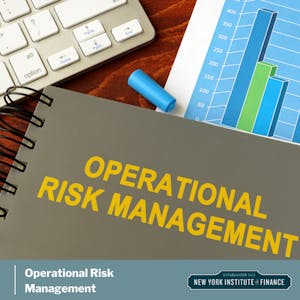Operational Risk Management Frameworks & Strategies
In the final course from the Risk Management specialization, you will be introduced to the different roles in risk governance and the benefits of establishing an operational risk management program at your own workplace. This course will highlight key elements of an Operational Risk Management framework and help you identify the appropriate elements to incorporate in your own program. By the end of the course, you will be able to capture, report, and investigate operational risk events, produce meaningful key risk indicator (KRI) data and trend analysis, assess organizational risk appetite, and design an Operational Risk Control and Self-Assessment program. To be successful in this course, you should have a basic knowledge of statistics and probability and familiarity with business operations. Experience with MS Excel and Python recommended.
Understand the fundamentals of operational risk management from the different roles in risk governance to the application of risk frameworks
Report and investigate operational risk events, produce KRI data and trend analysis, and implement operational risk appetite frameworks
Build and implement an operational risk assessment program
Syllabus
Syllabus - What you will learn from this course
Week 1
Getting Started
Week 2
Module 01: Operational Risk Management Setup
In the final course from the Risk Management specialization, you will be introduced to the different roles in risk governance and the benefits of establishing an operational risk management program at your own workplace. This course will highlight key elements of an Op Risk Management framework and help you identify the appropriate elements to incorporate in your own program. By the end of the course, you will be able to capture, report, and investigate operational risk events, produce meaningful key risk indicator (KRI) data and trend analysis, assess organizational risk appetite, and design an Operational Risk Control and Self-Assessment program.
Week 3
Module 02: Operational Risk Identification Tools
To be successful in this course, you should have a basic knowledge of statistics and probability and familiarity with business operations. Experience with MS Excel and Python recommended.
Week 4
Module 03: Operational Risk Measurement and Analysis
We’ll begin by looking at the operational risk management setup.
Week 5
Module 04: Operational Risk Framework and Governance
In this module we will look at the tools that operational risk managers use to flag and identify risks.
Week 6
End of Course
FAQ
When will I have access to the lectures and assignments?
Access to lectures and assignments depends on your type of enrollment. If you take a course in audit mode, you will be able to see most course materials for free. To access graded assignments and to earn a Certificate, you will need to purchase the Certificate experience, during or after your audit. If you don't see the audit option:
What will I get if I subscribe to this Specialization?
When you enroll in the course, you get access to all of the courses in the Specialization, and you earn a certificate when you complete the work. Your electronic Certificate will be added to your Accomplishments page - from there, you can print your Certificate or add it to your LinkedIn profile. If you only want to read and view the course content, you can audit the course for free.
Is financial aid available?
Yes. In select learning programs, you can apply for financial aid or a scholarship if you can’t afford the enrollment fee. If fin aid or scholarship is available for your learning program selection, you’ll find a link to apply on the description page.
Reviews
The course address the essential element of Operational Risk Management in Banking as well as the framework and tools in managing and governing operational Risk
